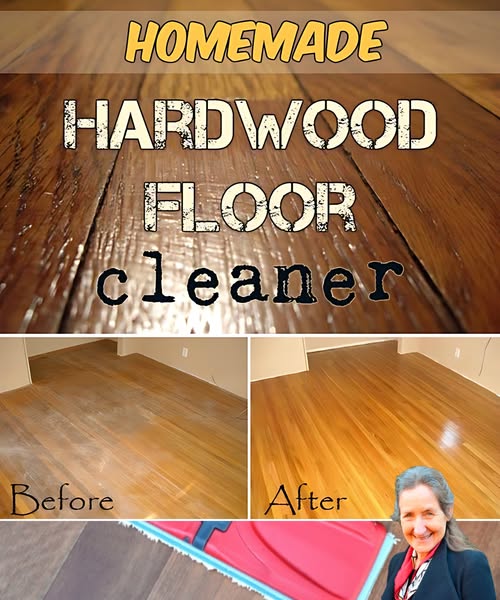“The Ultimate Homemade Hardwood Floor Cleaner: Non-Toxic and Multi-Purpose!”
Keeping your hardwood floors clean and gleaming doesn’t have to involve expensive, chemical-laden cleaners. A simple, homemade solution can effectively clean your hardwood floors and even more surfaces in your home, all without harming the environment or your health. With just a few common ingredients, you can create a versatile and non-toxic cleaner that’s as effective as store-bought products.
Why Choose a Homemade Cleaner?
Store-bought cleaning solutions often contain harsh chemicals that can emit fumes and irritate your skin or respiratory system. Moreover, many commercial hardwood floor cleaners leave residue or dull the natural shine of your floors over time. By making your cleaner at home, you control the ingredients, ensuring it’s both safe and effective. Plus, it’s cost-effective and eco-friendly, reducing plastic waste from store-bought products.
The Ingredients and Their Benefits
This homemade hardwood floor cleaner requires just five key ingredients. Here’s a breakdown of their roles and benefits:
- Distilled Water (1 cup):
Distilled water is free of minerals and impurities, making it ideal for preventing streaks and residues on hardwood surfaces. If you’re in a pinch, filtered tap water works, but it’s best used for short-term storage to avoid microbial growth. - White Distilled Vinegar (1/2 cup):
Vinegar is a natural disinfectant that breaks down grime, grease, and dirt. Its slightly acidic nature helps cut through stubborn stains without damaging your floors. It’s particularly effective on sealed hardwood surfaces. - Isopropyl Alcohol (1/2 cup):
Also known as rubbing alcohol, this ingredient evaporates quickly, reducing the likelihood of streaks or water damage on your hardwood floors. It also acts as a mild disinfectant, making it ideal for maintaining hygiene. - Dish Soap (2-3 drops):
A small amount of dish soap helps cut through grease and sticky residues. Opt for a gentle, non-toxic dish soap to maintain the cleaner’s eco-friendly appeal. - Essential Oils (25-30 drops):
Essential oils add fragrance and antibacterial properties. This recipe includes a mix of lavender, orange or lemon, tea tree oil, and peppermint, offering a refreshing and clean scent while naturally deterring pests like ants.
How to Make the Cleaner
Creating this all-purpose cleaner is a straightforward process:
- Gather a fine-mist spray bottle with at least a 16 oz capacity.
- Add 1 cup of distilled water, 1/2 cup of white distilled vinegar, 1/2 cup of isopropyl alcohol, and 2-3 drops of dish soap to the bottle.
- Drop in your chosen essential oils. The suggested combination is 7 drops of lavender, 7 drops of orange or lemon, 10 drops of tea tree oil, and 5 drops of peppermint. Adjust the blend to your preference.
- Shake the bottle well to combine all the ingredients.
Your homemade hardwood floor cleaner is now ready to use!
How to Use the Cleaner
To achieve spotless, streak-free hardwood floors, follow these simple steps:
- Prepare the Surface:
Sweep or vacuum the floor to remove dust, dirt, and crumbs. This ensures the cleaner can effectively tackle deeper grime without spreading debris. - Spray the Cleaner:
Lightly mist the cleaner onto the hardwood surface. For smaller areas, spray directly onto a microfiber cloth. - Wipe Clean:
Use a microfiber mop or cloth to wipe away dirt and residue. Microfiber is gentle on hardwood, preventing scratches while absorbing dirt and moisture. - Allow to Dry:
Since the alcohol content helps the solution evaporate quickly, you won’t need to rinse or dry the floor manually.
Tips for Best Results
- Avoid Over-Saturating:
Too much liquid can damage hardwood floors over time, especially if they are not sealed properly. Always use a fine mist and avoid puddles. - Test Before Use:
If you’re unsure about how this cleaner will react with your floor’s finish, test it on a small, inconspicuous area first. - Storage:
Store the cleaner in a cool, dry place, away from direct sunlight. Use distilled water for longer storage to prevent contamination.
Multi-Purpose Cleaning Power
This solution isn’t just for hardwood floors. Its gentle yet effective formula makes it suitable for a variety of surfaces, including:
- Laminate Flooring: Maintains a streak-free shine.
- Countertops: Cuts through grease and grime without leaving a residue.
- Bathroom Surfaces: Perfect for disinfecting sinks, tiles, and even mirrors.
- Windows and Glass: The alcohol helps create a streak-free finish.
However, avoid using this cleaner on unsealed wood or delicate stone surfaces, as the vinegar may cause damage.
Why Essential Oils Matter
The essential oils in this recipe do more than add fragrance. Tea tree oil, for example, is renowned for its antifungal and antibacterial properties, while lavender and citrus oils offer calming and uplifting scents. Peppermint oil is also a natural insect repellent, making this cleaner ideal for keeping bugs at bay.
Cost Comparison
Making this cleaner at home can save you significant money. The ingredients, many of which you likely already have, cost just a fraction of commercial cleaning products. Moreover, you can refill your spray bottle multiple times with a single batch of ingredients, reducing waste and cost.
Final Thoughts
This DIY hardwood floor cleaner proves that you don’t need harsh chemicals to achieve a clean, beautiful home. Its non-toxic nature makes it safe for families with children or pets, and its versatility means it can replace multiple cleaning products. Give it a try, and you’ll be amazed at how effective and budget-friendly it is!
This cleaner is a testament to how simple, natural solutions can outshine their chemical-laden counterparts. With just a spray and a wipe, your floors—and other surfaces—will sparkle like new!
